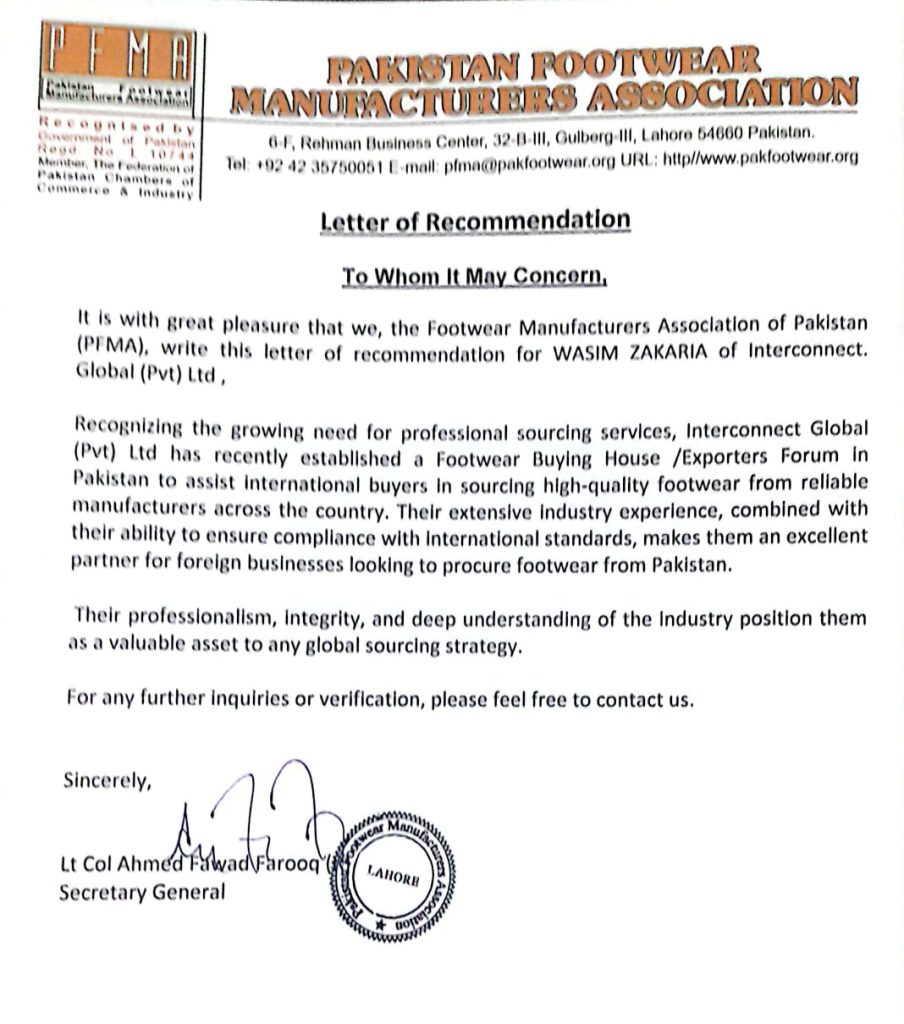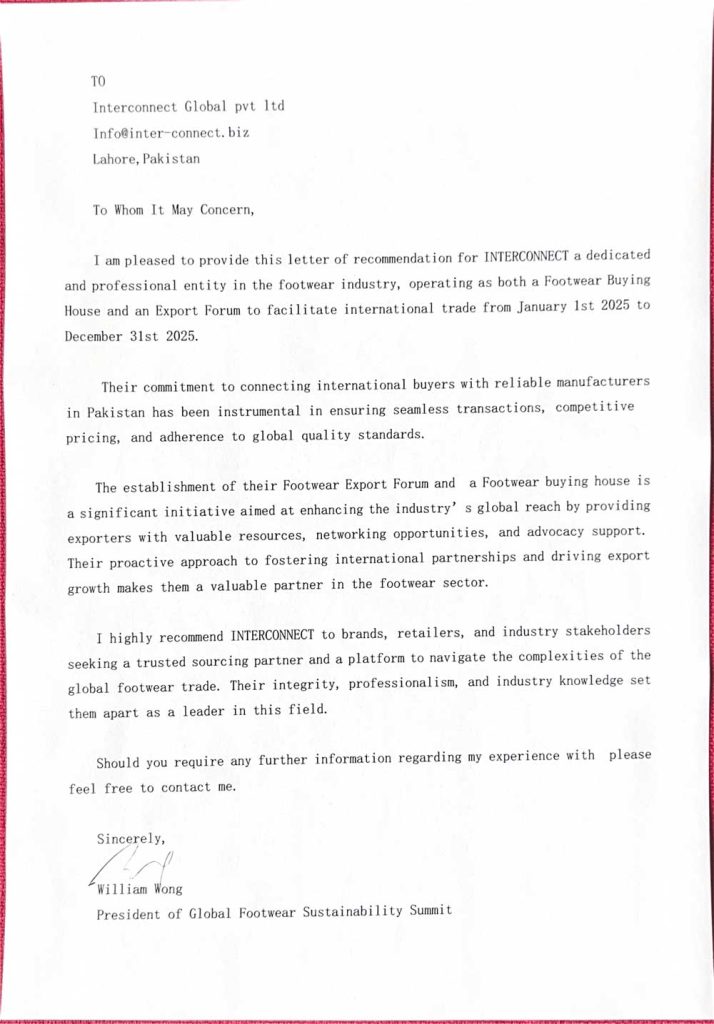INTERCONNECT GLOBAL (PVT) LTD is honored to receive an official letter of recommendation from the esteemed Pakistan Footwear Manufacturers Association (PFMA), recognizing the exceptional contributions and expertise of Mr. Wasim Zakaria.
With over 40 years of dedicated service in footwear manufacturing and global exports, Mr. Zakaria has significantly elevated Pakistan’s footwear industry standards, showcasing deep industry knowledge, extensive local and international networks, and an unwavering commitment to quality.
Acknowledged by the PFMA as a reliable sourcing partner for international buyers, INTERCONNECT GLOBAL has demonstrated professionalism, integrity, and strategic industry insights. This recommendation highlights our proficiency in ensuring compliance with international standards, making INTERCONNECT GLOBAL an ideal partner for businesses seeking high-quality footwear sourcing from Pakistan. This prestigious recognition from the PFMA further strengthens INTERCONNECT GLOBAL’s position as a trusted leader in the footwear export industry, reaffirming our dedication to excellence and client satisfaction.

By Mr. William Wong
President, Global Footwear Sustainability Summit
This letter of recommendation reflects Interconnect’s proven commitment to international trade excellence, reliability in sourcing, and professionalism in the global footwear industry
Certificate of Recognition from Global Footwear Sustainability Summit President – William Wong

Interview Title:
“Global Sourcing, Sustainability, and the Future of Footwear Trade”
An Insightful Conversation with William Wong
Nike and Lululemon Bet Big on Vietnam. They Bet Wrong.
Trump’s new tariffs force U.S. apparel and shoe makers to scour the world for new places to manufacture; ‘We are done with this game of whack-a-mole’
When President Trump imposed tariffs on Chinese imports during his first term, apparel brands turned to Plan B—moving production to other parts of Asia, including Vietnam, Cambodia and Bangladesh.
Now they need a Plan C.
Trump on Wednesday announced new tariffs of more than 25% on goods from each of the top six apparel-exporting countries to the U.S. China still comes out the highest, with a total tariff rate estimated by economists at around 65% to 70%. The blitz included new tariffs of 49% on products from Cambodia, 46% for Vietnam and 37% for Bangladesh. Trump Friday said that Vietnam leader To Lam told him during a phone call that he would cut Vietnam’s tariffs down “to ZERO if they are able to make an agreement with the U.S.” News of the call, which Trump posted about on social media, boosted stocks of companies that make their goods in Vietnam.
U.S. imports of apparel and footwear from the top exporting countriesSource: U.S. Census Bureau.
American companies since Wednesday have been scouring the world for other options. If the levies remain in place, apparel and shoe makers—and their American consumers—likely won’t be able to escape the impacts of the tariffs.
Outside of Asia, few countries have the factories and trained workforces to churn out the vast quantities of shirts and shoes demanded by American shoppers. To the extent that other options exist—in places like Turkey, which got off lightly with the minimum 10% tariff—a stampede of new buyers is expected to quickly drive up factory prices. Chris Riccobono, the founder and executive chairman of apparel company Untuckit, said he is considering moving production out of Vietnam, where about 40% of his shirts, pants and jackets are made. On his list of possibilities are Peru and Mauritius, where he already makes some goods and tariffs are lower. The new tariff on Peru is 10%.
Mauritius, population 1.3 million, won’t cut it for giant brands such as Nike NKE 3.52%increase; green up pointing triangle and H&M, which are highly dependent on East Asian supply chains. Nike makes 95% of its shoes in three heavily tariffed, populous Asian countries—Vietnam, China and Indonesia—and will struggle to find new factories elsewhere in a pinch, analysts say.
Nike shares fell 13% Thursday and rose 4% Friday on news of the possible deal with Vietnam.
Searching the map
Vietnam, where the U.S. waged a 20-year war, was largely off limits to American businesses until the 1990s, when the U.S. lifted economic restrictions. Vietnam blossomed more recently as a lower-cost alternative to Chinese production.
Saitex, which makes denim at its factories in Vietnam for brands including Ralph Lauren, Madewell and Everlane, is considering shifting production to Los Angeles, where it operates a factory staffed by 250 employees, said Chief Executive Sanjeev Bahl.
Office Address:
512, 5th Floor, Suit 12, Al Hafeez Business Center, Gulberg 3, Lahore, Pakistan
Email: info@inter-connect.biz
Looking for a trusted sourcing partner? Let’s connect today.
Join a Newsletter
All rights reserved | © 2025 Inter Connect